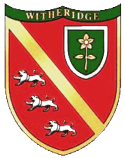

|
Dr Archibald Houghton Brown took over the Witheridge Practice based on the Firs from Dr Richard E H Leach in 1907, and was to stay until succeeded by Dr Ernest Aubrey Price around 1919. Prior to moving here he had run a practice in the suburbs for some years, but without liking it much, however, his move to Witheridge proved to be much more to his liking. He was married to Agnes Mary (Molly) Stratton, and they had two children, Jack Houghton Brown and Christopher Houghton Brown. The following piece, entitled "A Country Practitioner", is based on notes made by Dr Houghton Brown in 1942, and which were donated to the Archive some years ago.
For six years I did a practice in the suburbs but not liking it, So, when presented to purchase a practice in Mid Devon (Witheridge) I took the opportunity, and loved it. It was eight miles from a station and ten from a town (Tiverton), the nearest doctor was eight miles away. No telephone, no electric light, no motors - this was thirty years ago. Actually 1907 - 1919. I found the Devon Farmers a very good lot and would do anything for you, when they once knew you, but you had to put up with a lot in many ways. It was very hard work to get anyone into hospital, they all had a dread of it, so one had to do all the minor operations oneself. This was on Sunday mornings as a rule, and dentistry as well. Any very bad accidents had to be sent in a cart or wagon to the hospital. I rode most of my rounds, the roads or tracks into the farms were too rough to drive. I kept four going as I often did thirty miles a day and always hunted on Saturday with the Stag Hounds. One thing I found was that the Devon people are very superstitious. I will tell you some things they did. A child with whooping cough was taken up the road until the mother came to a cross-roads, then the mother turned sharp right and the whooping cough went straight on! Child cured. I found a man with a very dirty back tied around his neck, inside was a toad's leg, to keep off Kings Evil. I was attending a boy with jaundice and had given him some calomel. I was called the next day and the mother told me she had cured him. I asked her how she had done it. "Well", she said, "I took some of his water and mixed it with some oatmeal and put it in the oven and made a good cake." "What did you do then?" I asked, "I gave it to the dog to eat and that cured my son, and you ought to let the big London doctors how to cure jaundice". I was called in to see a woman with a big abscess of the breast; when I came to clean it up I found a large garden worm in it; this was an old way of curing an abscess, she told me. I put a thermometer in a farmer's mouth, one day, he looked at me very hard for some time when I took it out, and said " I don't feel no better for that!" In the winter I always had an assistant, but it was very hard to find one that could ride, they always said that they had ridden. I would send them out the first day with a groom, or my wife, to show them the way about for a short round of about fifteen miles. Next morning they would stand to eat their breakfast! and ask if they could drive. They might stay a week or two and then go - much too hard work. Now I must tell you about a bad day and a good one. A day in the winter with snow about a foot deep. I started out to drive to a village over the moors about twelve miles away. When I got to the top of the moors the snow was too thick to drive on, so I told the groom to drive back to the village and wait for me. I then started to walk and got along the banks and so down to the village. I kept drugs in a room at t he Pub. I saw my patient and then had a message to go to the next village about two miles on. They had cut a path through the snow, so on I went, saw my patient and then the farmer said it would be much shorter to go back over the moor as I knew the way. I started off, it was now snowing hard and going across the moor I fell into a snow drift, having forgotten that a cutting had been made into a chalk pit, it was very deep and took me a long time to get out, luck had it that I had a flask of whiskey with me, and after a dram I set off again and got back to the village only to find that the groom had waited a long time and then gone home. So there was nothing to do for it but to walk. Got home about 12 o'clock very tired, good supper and a hot bath and quite alright next day. A good day - November 30th 1917. Coming home after being out all night at a confinement, it was just getting light as I rode down a lane when a stag crossed just in front of me, he was a Royal, all his knights on top. I saw him go into a small plantation. So I waited a bit, then got off my horse, tied him up and walked around the plantation. I could not slot him so I knew he had not come out. I rode home, saw some patients and then rode to meet the Staghounds. It was wartime and no-one turned up except the huntsman and his pack He said "What are we going to do today Doc?" So I told him I had harboured a big stag about a mile away and must hunt him. So off we went and put all the pack on, they got him at once and he very soon broke cover and away we hunted him for five hours right down to the River Taw. We lost hounds once as they went through a park and the gates were locked, so we had to go round. After the Stag was killed a farmer asked us to have a drink, so we gave the horses some gruel and a good rest. We started home in the dusk, so I whipped in. It was a long ride back to kennels, about twenty miles. We did stop once and woke the landlord up at a Pub, he came down and gave us a good hot toddie. After I had seen the hounds in kennel I got off home, another ten miles, and got into bed at one o'clock. Anyone practising in Devon now would find it a very different thing, good roads everywhere, every farmer has his motor and most villages on the telephone; this is, I think, a curse as in the old days a farmer would think twice about going for a doctor when he had to ride, now he only rings at any old time and it is very trying when you have had a long day and perhaps have to go over the same round again. Of course there was very little society and my wife often drove ten miles to play tennis and we only had a motor a very short time as the roads were so narrow and bad, and very cut up by the timber hauling during the war, and most of the farms a mile off the proper roads. We generally drove an American Trap, just two wheels, a seat and foot board, beautifully light. I had an American Trotter part of the time, and also drove tandem, it was all great fun. Previous Last Edited 13/07/2006 Copyright © 2000-2006 Witheridge Unless otherwise indicated on the page in question, the photographic images reproduced on this site belong to the Witheridge Archives, and, as such may not be reproduced for commercial purposes without written permission. However, you are welcome to use any of the photographs belonging to the archive for personal and/or non-commercial use. Any material shown as not being owned by the archive may not be reproduced in any form without first receiving written permission from the owner of the material in question. This article is based on notes written by Dr Houghton-Brown in 1942, and deposited in the Archive. |

